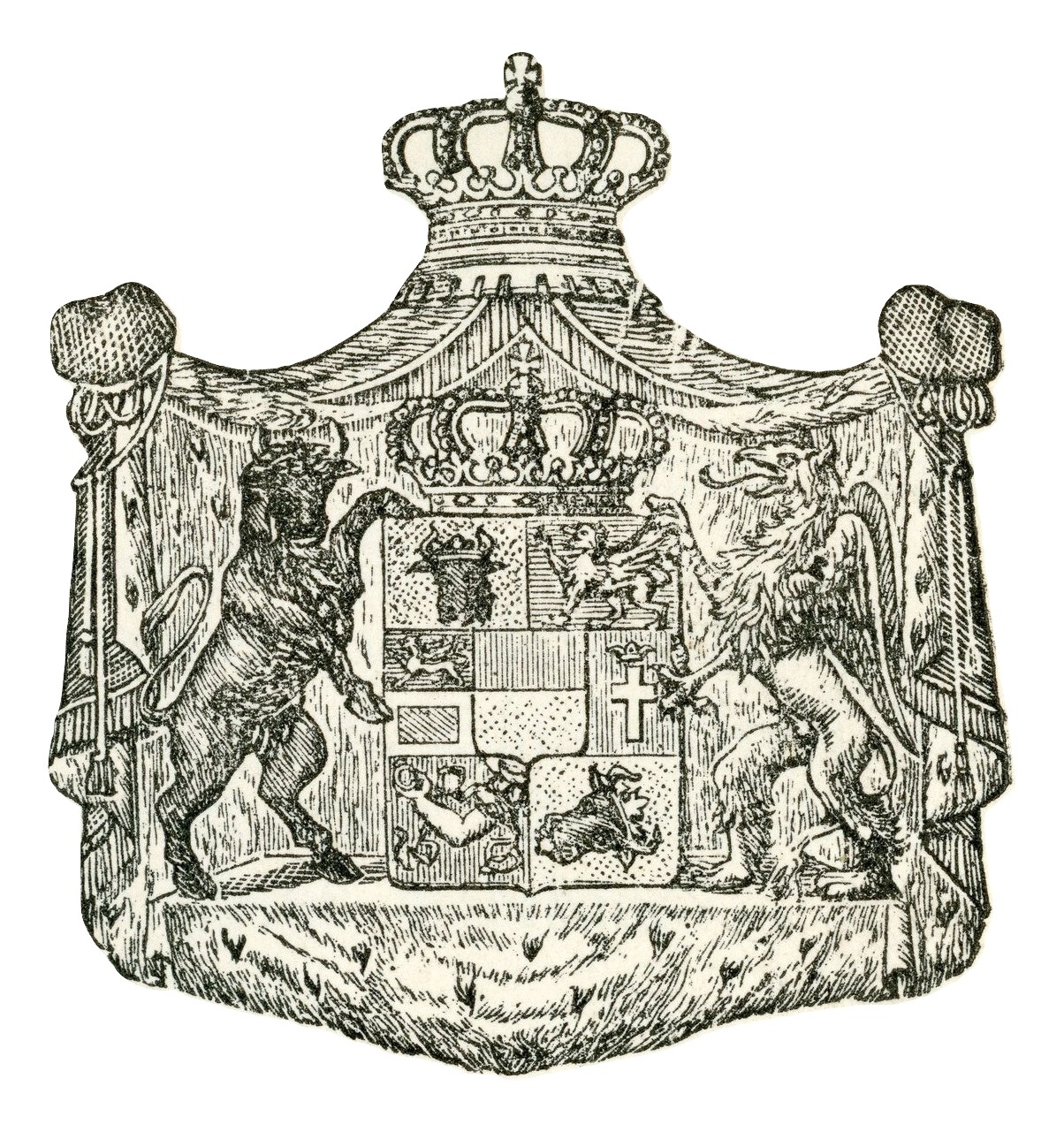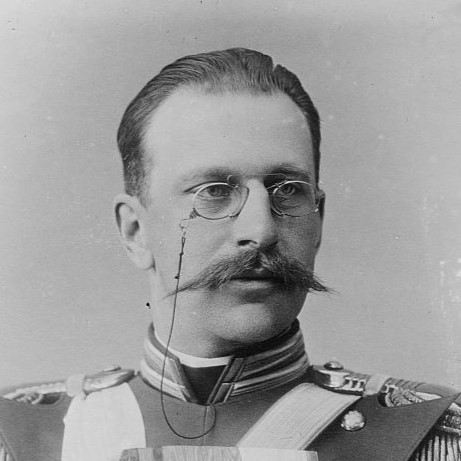His Highness Georg Alexander Michael Friedrich Wilhelm Franz Carl, Duke of Mecklenburg, Prince of Wenden, Schwerin and Ratzeburg, Count of Schwerin, Lord of the Lands of Rostock and Stargard, was born on 6 June 1859 at the Remplin Palace. He was the eldest surviving son of Duke Georg and Duchess Ekaterina.
Early years
Duke Georg Alexander was born during his parents visit to Mecklenburg for the 80th birthday celebrations of his grandfather Grand Duke Georg. His christening into the Lutheran Church took place at Remplin on 10 July 1859. Amongst his godparents were Grand Duke Georg, Emperor Aleksandr II of Russia and Grand Duke Mikhail Nikolaevich of Russia.
The newborn Duke Georg Alexander did not spend long in Mecklenburg before the end of his grandfather’s birthday celebrations meant the family returned to their permanent residences in the Russian Empire at the Mikhailovsky Palace in St Petersburg and the Oranienbaum Palace on the Gulf of Finland. In Russia Duke Georg Alexander would be known by the Russian form of his name Georgi Georgievich. Although he grew up in Russia Duke Georg Alexander would return to Mecklenburg on visits with his family during which they would stay at their Remplin Palace property.
Education
Duke Georg Alexander’s education began at the age of 7 through home tutoring. Having been made an Ensign of Grand Duke Mikhail Pavlovich’s 1st Artillery Brigade shortly after his birth, Duke Georg Alexander’s parents wish for him to pursue a career in the Russian artillery meant a military education was an area of particular focus for his studies. Among other topics covered during his education were the Latin, Russian, German, French and English languages and music which would become his greatest passion. He received tuition from the famous Russian cellist Karl Davydov and developed into a talented cellist himself.
Duke Georg Alexander’s father did not live long enough to see his son pass his artillery officer exams and gain the rank Second Lieutenant in June 1879 having died three years before. A full time army career was not yet taken up however as at the end of 1879 Duke Georg Alexander left Russia to continue with his studies in Germany. He spent his first three semesters abroad at the University of Strasbourg attending lectures on law, national economics and the history of the revolutionary period. He also received private tuition in Roman law and state law.
In Easter 1881 Duke Georg Alexander transferred to the University of Leipzig where he spent a further three semesters continuing his studies in national economics and taking up the study of international law, the history of art and culture in the Renaissance period and the history of Germany from the Congress of Vienna onwards. During his time at university Duke Georg Alexander further developed his passion for music by receiving private tuition from noted professors Gustav Jacobsthal in Strasbourg and Carl Reinecke in Leipzig, and during this period a piece of his own composed music, ‘Suite for String Instruments’, was performed at the Neustrelitz Theatre in 1882. Duke Georg Alexander received his Doctor of Philosophy degree from Leipzig in 1883.
Army career
With the end of studies Duke Georg Alexander now pursued a full time career in the Imperial Russian Army. On 30 August 1882 he was promoted to the rank Lieutenant of the Guard and began serving in the Grand Duke Mikhail Pavlovich’s 1st Artillery Brigade. In 1889 to become familiar with the cavalry Duke Georg Alexander joined the Life Guards Mounted Grenadier Regiment on an initial three year secondment before the move was made permanent.
Duke Georg Alexander was promoted to the rank Captain of the Guard on 1 April 1890, with the rank renamed Staff Captain of the Guard in 23 March 1891. He again gained promotion to the now more senior Captain of the Guard rank on 6 December 1894 and that of Colonel of the Guard on 14 May 1896 during the coronation celebrations of Emperor Nikolai II. As an extended member of the Russian Imperial Family this was the second coronation he attended, the first being that of Emperor Aleksandr III in 1883.
On 14 December 1902 Duke Georg Alexander gained promotion to the rank Major General and appointment as Commander of the Life Guards Dragoon Regiment and he was commanded his regiment in St Petersburg during the Russian Revolution of January 1905 until the situation in the capital had stabilised. In 1906 he was appointed to the Retinue of the Emperor of Russia and was made commander of the 1st Brigade of the 1st Guards Cavalry Division before being appointed placed at the disposal of the Commander-in-Chief of the St. Petersburg Military District a year later.
Family
As a young man Duke Georg Alexander fell in love with Natalia Feodorovna Vanljarskaya, a lady in waiting to his mother, making it the first time a member of the House of Mecklenburg-Strelitz had wished to marry a spouse who although belonging to the nobility did not belong to another royal family. Despite the initial reservations of his mother, the couple were married on 14 February 1890 at the Mikhailovsky Palace’s private chapel. Apart from his immediate family the wedding was also attended by Emperor Aleksandr III and Empress Maria Feodorovna of Russia and other members of the Russian Imperial Family.
Although his uncle Grand Duke Friedrich Wilhelm had consented to the marriage, as Duke Georg Alexander was firmly established in Russia and his new wife fiercely proud of her Russian identity the marriage did not receive official dynastic recognition and Duke Georg Alexander renounced his rights to the throne. Because any children from the marriage would not be dynastic members of the House of Mecklenburg-Strelitz, in order to compensate for this on 18 March 1890 Grand Duke Friedrich Wilhelm bestowed the hereditary title Countess of Carlow upon Natalia. As such the couple’s four children Catherine, born 1891, Marie, born 1893, Natalia, born 1894, and Georg, born 1899, all bore their mothers Carlow title.
After the death of Duke Georg Alexander’s mother in 1894, he and his siblings sold the Mikhailovsky Palace to the Russian Emperor Nikolai II. Duke Georg Alexander then acquired as his family home 46 Fontanka, a river embankment mansion in St Petersburg, while the Oranienbaum Palace served as their summer residence.
Music
Alongside his army career Duke Georg Alexander pursued his passion for music and supported a number of charitable organisations. Able to play the cello, piano and violin and being a composer of his own music, his 46 Fontanka residence was regarded as one of St Petersburg musical centres. He was a member of the Imperial Russian Musical Society, whose first president was his grandmother Grand Duchess Elena Pavlova, and in 1889 he was tasked by the society with heading up a committee to mark 50th anniversary celebrations of the career of the famous Russian pianist and composer Anton Rubinstein.
In 1896 Duke Georg Alexander established his own string quartet called the Mecklenburg Quartet and enlisted a number of talented Russian musicians to its ranks. He was deeply involved with his quartet and would directly oversee their rehearsals at his 46 Fontanka residence. The quartet itself proved highly successful not only in Russia but also in the other major European capitals where they held concerts.
Death
On 26 October 1909, Duke Georg Alexander and his siblings wrote to Grand Duke Adolf Friedrich V requesting permission to be buried in Oranienbaum rather than at the family crypt in Mirow which Grand Duke Adolf Friedrich V gave his consent to.
Unexpectedly in the early hours of 5 December 1909 Duke Georg Alexander died suddenly aged 50 at his St Petersburg residence having returned from the Artillery Club the night before. In line with his wishes he was therefore buried in Oranienbaum rather than in the family crypt in Mirow.
Honours
- Grand Cross with the Crown in Ore of the House Order of the Wendish Crown (16 February 1876)
- Grand Duke Friedrich Wilhelm and Grand Duchess Augusta 50th Wedding Anniversary Medal (1893)
- Grand Class of the Order of the Golden Star, Bukhara
- Grand Cross of the Order of the Lion and the Sun, Iran
- Knight of the Order of St Andrew, Russia (1903)
- Knight of the Order of St Alexander Newski, Russia (1903)
- 1st Class of the Order of St Anne, Russia (1903)
- Knight of the Order of White Eagle, Russia (1903)
- 1st Class of the Order of St Stanislaus, Russia (1903)
- 2nd (1908), 3rd (1898) and 4th (1884) Class of the Order of St Vladimir, Russia
- Emperor Aleksandr III Coronation Medal, Russia (1883)
- Emperor Nikolai II Coronation Medal, Russia (1896)
- Battle of Poltava 200th Anniversary Medal, Russia (1909)
- Red Cross Medal, Russia
- Grand Cross of the House Order of the White Falcon, Saxe-Weimar-Eisenach (1881)
- Grand Cross of the Saxon Ernestine House Order, Saxe-Altenburg (1890)

